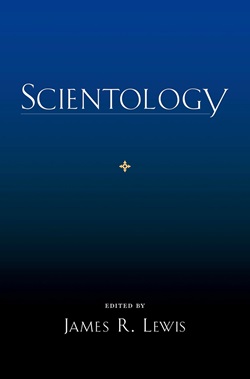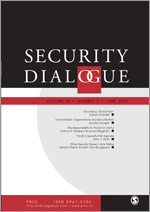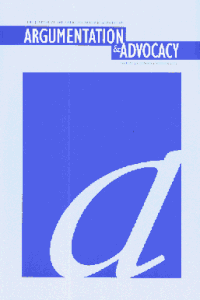
In academic publishing, a scientific journal is a periodical publication intended to further the progress of science, usually by sharing findings from research with readers. They are normally specialized based on discipline, with authors picking which one they send their manuscripts to.

Debate is a process that involves formal discourse on a particular topic, often including a moderator and audience. In a debate, arguments are put forward for common opposing viewpoints. Debates have historically occurred in public meetings, academic institutions, debate halls, coffeehouses, competitions, and legislative assemblies. Debate has also been conducted for educational and recreational purposes, usually associated with educational establishments and debating societies. These debates put an emphasis upon logical consistency, factual accuracy, and emotional appeal to an audience. Modern forms of competitive debate also include rules for participants to discuss and decide upon the framework of the debate.

Scientific literature comprises scholarly publications that report original empirical and theoretical work in the natural and social sciences. Within an academic field, scientific literature is often referred to as "the literature". Academic publishing is the process of contributing the results of one's research into the literature, which often requires a peer-review process.
The National Parliamentary Debate Association (NPDA) is one of the two national intercollegiate parliamentary debate organizations in the United States. The other is the American Parliamentary Debate Association. Its membership is national with participating schools throughout the country. In 2015, NAPA was the largest debating organization in the United States with around 200-250 participating schools in any given year.

Together, legal psychology and forensic psychology form the field more generally recognized as "psychology and law". Following earlier efforts by psychologists to address legal issues, psychology and law became a field of study in the 1960s as part of an effort to enhance justice, though that originating concern has lessened over time. The multidisciplinary American Psychological Association's Division 41, the American Psychology-Law Society, is active with the goal of promoting the contributions of psychology to the understanding of law and legal systems through research, as well as providing education to psychologists in legal issues and providing education to legal personnel on psychological issues. Further, its mandate is to inform the psychological and legal communities and the public at large of current research, educational, and service in the area of psychology and law. There are similar societies in Britain and Europe.

Argumentation theory, or argumentation, is the interdisciplinary study of how conclusions can be supported or undermined by premises through logical reasoning. With historical origins in logic, dialectic, and rhetoric, argumentation theory includes the arts and sciences of civil debate, dialogue, conversation, and persuasion. It studies rules of inference, logic, and procedural rules in both artificial and real-world settings.

HeinOnline (HOL) is a commercial internet database service launched in 2000 by William S. Hein & Co., Inc., a Buffalo, New York publisher specializing in legal materials. The company began in Buffalo, New York, in 1961, and is currently based in nearby Getzville, NY. In 2013, WSH Co. was the 33rd largest private company in western New York, with revenues of around $33 million and more than seventy employees.
Television studies is an academic discipline that deals with critical approaches to television. Usually, it is distinguished from mass communication research, which tends to approach the topic from a social sciences perspective. Defining the field is problematic; some institutions and syllabuses do not distinguish it from media studies or classify it as a subfield of popular culture studies.
Evidence-based management (EBMgt) is an emerging movement to explicitly use the current, best evidence in management and decision-making. It is part of the larger movement towards evidence-based practices.
Charles Arthur Willard is an American argumentation and rhetorical theorist. He is a retired Professor and University Scholar at the University of Louisville in Louisville, Kentucky, USA.
Dale Hample is an American argumentation and rhetorical scholar, associate professor at the University of Maryland. He has published many peer-reviewed journal articles, book chapters, and written one book and edited another.

The Web of Science is a paid-access platform that provides access to multiple databases that provide reference and citation data from academic journals, conference proceedings, and other documents in various academic disciplines. It was originally produced by the Institute for Scientific Information. It is currently owned by Clarivate.
David H. Zarefsky is an American communication scholar with research specialties in rhetorical history and criticism. He is professor emeritus at Northwestern University. He is a past president of the National Communication Association (USA) and the Rhetoric Society of America. Among his publications are six books and over 70 scholarly articles concerned with American public discourse, argumentation, rhetorical criticism, and public speaking are books on the Lincoln-Douglas debates and on the rhetoric of the war on poverty during the Johnson administration. His lectures on argumentation and rhetoric can be heard in a course for The Teaching Company.

Scientology is an edited volume about the Church of Scientology and the beliefs and movement called Scientology. It was edited by James R. Lewis, and published in March 2009 by Oxford University Press. In addition to Lewis, other contributors to the book include J. Gordon Melton, William Sims Bainbridge, Douglas E. Cowan, David G. Bromley, Anson Shupe, James T. Richardson, and Susan J. Palmer. Scientology gives an overview and introduction to the organization, and presents an analysis of the movement from the perspective of sociology. The book compares the organization to religious movements, and goes over its history of controversy. It delves into the practices of the organization and the activities undertaken at its facilities.

The Philosophy Documentation Center (PDC) is a non-profit publisher and resource center that provides access to scholarly materials in applied ethics, classics, philosophy, religious studies, and related disciplines. It publishes academic journals, conference proceedings, anthologies, and online research databases, often in cooperation with scholarly and professional associations. It also provides membership management and electronic publishing services, and hosts electronic journals, series, and other publications from several countries.

Security Dialogue is a peer-reviewed academic journal that publishes scholarly articles which combine contemporary theoretical analysis with challenges to public policy across a wide-ranging field of security studies. The journal is owned by the Peace Research Institute Oslo which also hosts the editorial office. As of 1 October 2015 Mark B. Salter is the editor-in-chief. Marit Moe-Pryce has been the managing editor of the journal since 2004. Current associate editors are Emily Gilbert, Jairus V. Grove, Jana Hönke, Doerthe Rosenow, Anna Stavrianakis, and Maria Stern.

Forensic Architecture is a multidisciplinary research group based at Goldsmiths, University of London that uses architectural techniques and technologies to investigate cases of state violence and violations of human rights around the world. The group is led by architect Eyal Weizman. He received a Peabody Award in 2021 for his work with Forensic Architecture.

Deep Sea Research is a peer-reviewed academic journal of deep sea research. It was established in 1953 by Pergamon Press. In 1962, it renamed itself Deep Sea Research and Oceanographic Abstracts, and returned to the Deep Sea Research title in 1977. In 1978, it split into two journals Deep Sea Research Part A: Oceanographic Research Papers and Deep Sea Research Part B: Oceanographic Literature Review. In 1993, Part A split into Deep Sea Research Part I: Oceanographic Research Papers and Deep Sea Research Part II: Topical Studies in Oceanography, while Part B was discontinued.

Competitive debate, also known as forensics or speech and debate, has a history in the United States dating back to colonial times. The practice, an import from British education, began as in-class exercises in which students would present arguments to their classmates about the nature of rhetoric. Over time, the nature of those conversations began to shift towards philosophical questions and current events, with Yale University being the first to allow students to defend any position on a topic they believed in. In the late nineteenth century, student-led literary societies began to compete with each other academically and often engaged in debates against each other. In 1906, the first intercollegiate debate league, Delta Sigma Rho, was formed, followed by several others. Competitive debate expanded to the secondary school level in 1920 with the founding of the National Speech and Debate Association, which grew to over 300,000 members by 1969. Technological advances such as the accessibility of personal computers in the 1990s and 2000s has led to debate cases becoming more complex and to evidence being more accessible.













